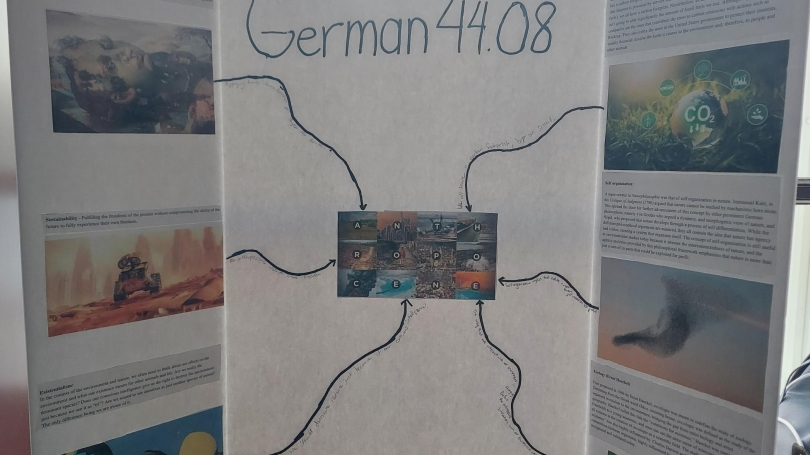
- Undergraduate
- Foreign Study
- Opportunities
- Inclusivity
- News & Events
- People
Back to Top Nav
Back to Top Nav
Back to Top Nav
In the Winter course German 44.08: Sustainability and German Environmental Imagination, students presented their "show-and-tell" posters on various concepts fundamental to understanding environmental issues. These compelling concepts included Animal Perceptions, Immersion and Interconnectivity, The Economy of Nature, Extrinsic and Intrinsic Value of Nature, Anthropomorphism and Sustainability, and Soundscapes. For their informative, creative, and fun posters, students collaborated in small groups on various texts and media. They transformed their classroom into an "art exhibition," where they acted as presenters of their projects and viewers of other works.
Students explained that they had a great time making their posters and viewing their classmates' presentations, emphasizing that the flexibility of this assignment allowed them to engage with the course material in new and insightful ways. The course instructor, Assistant Professor of German Studies Meryem Deniz, expressed her amazement at her students' thoughtfulness, creativity, and presentation skills. Deniz noted that class discussions, poster presentations, and final projects reflected the course's interdisciplinary approach to the environment and sustainability, incorporating physics, biology, the history of science, sound studies, philosophy, literature, arts, and environmental studies. A field trip to the Hood Museum and a presentation on the loss of biodiversity and the sixth extinction, given by Stanford Biology Professor Rodolfo Dirzo, supported the experimental and interactive aspects. Professor Deniz is excited to teach this course in Summer 2025.
Deniz's research and teaching focus on late eighteenth- and early nineteenth-century German literature and poetics, contemporary transnational literature, and migration studies as they intersect with the environmental humanities and (new) materialisms. She provided further insight into her work in the article "What the German Romantics Can Teach Us About Sustainability," by Austin Danforth.